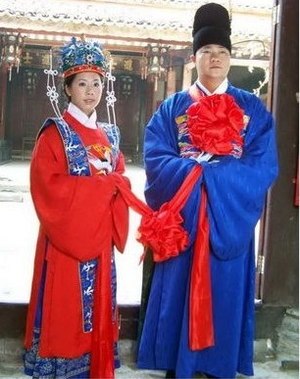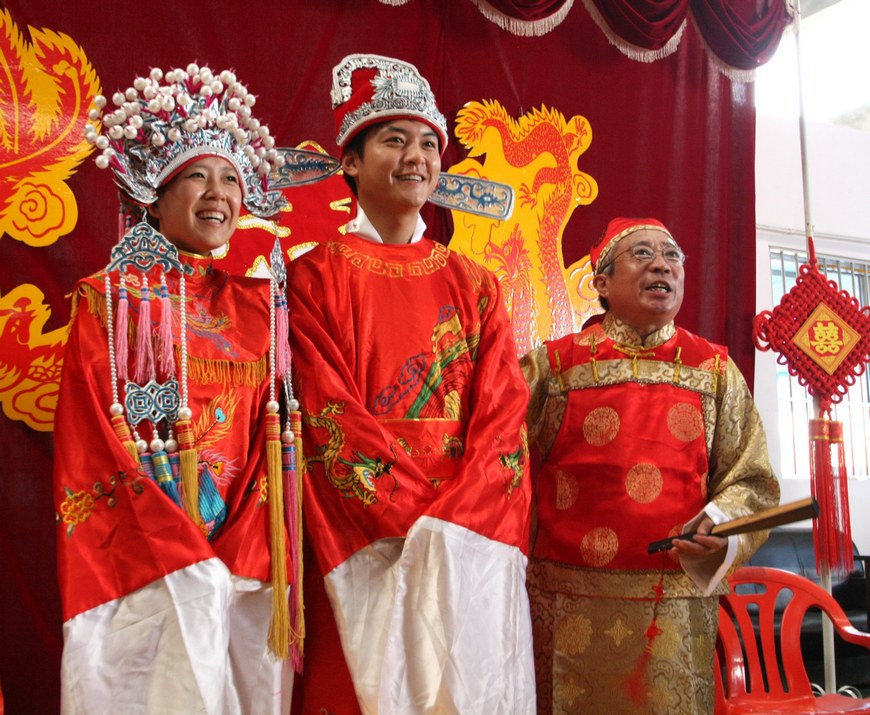History of chinese matchmaking
Contents:
But such extreme policies were rare. Ancient Chinese had more subtle ways to encourage people to find a spouse. As early as the Zhou Dynasty c11th century to BC , officials in charge of people's marriages appeared. The Rites of Zhou Zhou Li , a Chinese book on organisational and bureaucracy theory from the middle of the 2nd century BC, recorded the creation of this kind of officer.
MATCHMAKERS, PARENTS AND MARRIAGE IN CHINA
During the Three Kingdoms , Southern frontiers in China had official matchmakers too. The traditional complicated engagement processes before marriage were also simplified by the policies of the Tang and Song governments, to encourage more people to get married quickly. Official matchmakers became more professional, appointed by the government and even with certificates of authority later in the Yuan Dynasty And in the Qing Dynasty , there were many such matchmakers in Xinjiang, where large numbers of male criminals and farmers were sent for land reclamation.
And to help them settle down, official matchmakers would help them find spouses. Yet not all of them were lucky enough to marry someone, due to the small number of women in the area. Ancient Chinese still had certain freedoms to get married with people they liked, rather than being completely manipulated by their parents or government. In the spring and autumn period BC , there was an annual mid-spring meeting on the third day of lunar March that gave unmarried people a chance to get to know each other. It's a bit like psychological consultation and they like to pour out their hearts to strangers," Gao says.
Marriage is still viewed as a necessary step in every adult's life and parents are often very much engaged in finding mates for their children.

Chinese parents flood public parks, armed with resumes of their unmarried adult children, to meet other parents with children to marry off, hoping to attract good matches. Some meet other parents in parks such as Zhongshan Park in Beijing and exchange notes on height. Parents with tall sons with good jobs or a degree from a prestigious university are often mobbed. The Los Angeles Times reported one year-old woman at the park looking for wife for her year-old son.
Chinese children have different view about their parents search for mates for them in parks. I told my mother not to go to the park. A widowed year-old pensioner, she was clearing a spot on the ground for a sign she had scrawled for her son. Yu held in place with a few fragments of brick and stone.
Hundreds of others trudged by, stopping occasionally to make an inquiry. Even so, when a woman in a green plastic visor paused to scan her sign that day, Ms. One afternoon last summer, however, there was a glimmer of hope. She was, in some eyes, a leftover woman. The daughter declined to meet at first. A week later, she called back: It was her first solid lead in months. Yu and her husband, who was sick with lung cancer, had left the northern city of Harbin in the hope of finding better treatment for his cancer in Beijing, where two of their sons already lived.
Yu stayed in an apartment on the outskirts of Beijing with her sons — one married; the other, Zhao Yong, still single at But one day, Ms. Yu came upon a crowd swarming under the elm trees near the Temple of Heaven. Yu feel awkward at first. Her elder two sons had found wives in traditional ways, one through a matchmaker, the other through a friend. Zhao, her youngest, had not. After losing his job in an electronics factory in Harbin, he followed his hometown sweetheart to Beijing.
They were in love and planned to marry. His family could not afford it, and the relationship ended.
Navigation menu
Zhao threw himself into his work as a driver and salesman. His former girlfriend married and had a baby.
Traditional Chinese marriage (Chinese: 婚姻; pinyin: hūnyīn), as opposed to marriage in In Chinese history there have been many times when marriages have . point the bridegroom's family arranged for the matchmaker to present a bride. In Chinese, the word xiangqin — commonly translated as “matchmaking” — is rich in cultural significance. It refers to single men and women.
He told his mother he had little time to think about marriage. The strangers in the park, uprooted from their traditional family and hometown networks, shared similar stories, and Ms. Yu found comfort there. Yu, as a rural mother, was permitted to have multiple offspring.
- Finding love in ancient China?
- my ex is already dating another guy!
- online dating interview!
- Chinese marriage - Wikipedia.
- dating someone with eczema!
- older dating site free!
Shengnan, like her son, are mostly poor rural men left behind as female counterparts marry up in age and social status. Zhao, was angry when he found out that she had been searching for a wife for him. But he has since relented. Zhao has a youthful, unlined face. Still, he worries that time is passing him by. To save money and to enhance his marriage prospects, he works two jobs simultaneously — one selling microwaves, the other cosmetics — crisscrossing the city on his electric bike.

An apartment, the urban equivalent of the bride price, is even further out of reach. Zhao has met several women on online dating sites, but he lost faith in the Internet when several women lied to him about their marital status and family backgrounds. His mother, however, had come through, arranging a meeting between him and the daughter of the woman she had met in the marriage market.
Zhao met the woman at a coffee shop.
Primitive Group Marriage
It was, he told me later, even more awkward than most first dates. A rural migrant and door-to-door salesman, he struggled to find a shared topic of interest with the woman, a year-old entrepreneur and Beijing native who had arrived driving a BMW sedan. Then, even before broaching the possibility of a second date, he said, the woman made a proposition: He had never heard a woman talk in such blunt, pragmatic terms.
A life of wealth and leisure sounded tempting. Zhao several days before he worked up the nerve to tell his mother he had rejected the offer. Matchmaking not only concerns Chinese young people, but also makes parents feel anxious. Such a phenomenon is unlikely to occur in developed Western nations, where the elderly tend to spend retirement in a more leisurely manner, instead of interfering in the personal affairs of their children.
It has existed in different forms all across the globe. Even though Muslim women are forbidden to marry non-Muslims in Islamic law, from it was frequently violated in Xinjiang since Chinese men married Muslim Turki Uyghur women, a reason suggested by foreigners that it was due to the women being poor, while the Turki women who married Chinese were labelled as whores by the Turki community, these marriages were illegitimate according to Islamic law but the women obtained benefits from marrying Chinese men since the Chinese defended them from Islamic authorities so the women were not subjected to the tax on prostitution and were able to save their income for themselves. This section needs expansion with: Already have an account? Matchmakers sometimes assume that female Ph.
In China, you find the opposite to be the case. It is becoming increasingly evident that Chinese society has failed to adequately prepare for its own rapidly aging population. Public services rarely cater to the needs of the elderly, and many retired Chinese become marginal members of society. In this context, elderly Chinese men and women have turned to matchmaking. Of course, they are in part motivated by a desire to find a partner for their children. However, studies have shown that these matchmaking corners have a success rate of less than 1 percent.
Many Chinese find wry humor in the fact that men who hold doctoral degrees sit at the top of the food chain, while women who are just as educated often sit at the bottom.
- BBC News Navigation!
- 2020 dating site in usa!
- indian dating sites india free!
- Ancient Chinese Marriage Customs?
- Accessibility links!
- best place to hook up in singapore!
At the same time, seniors view matchmaking corners as a social activity, much like their beloved square dances and walking tours. At local marriage markets, they gather to gossip away the time and perhaps ease feelings of solitude or aimlessness.
China’s Love-Hate Relationship With Traditional Matchmaking
Recently, an article about matchmaking went viral on Chinese social media. At a matchmaking market in the capital, one mother was quoted as saying: Matchmaking has become a source of controversy, as it relies on a cruel hierarchy loaded with prejudice and contempt. Those at the bottom are, naturally, poorly paid part-time workers without a city hukou , car, or house. Things get even more interesting when matchmaking collides with traditional superstition and entrenched gender discrimination. Matchmakers sometimes assume that female Ph.